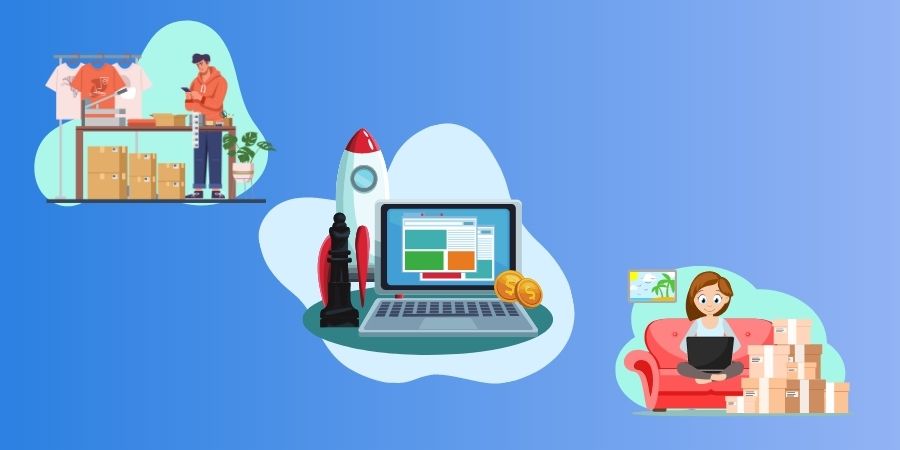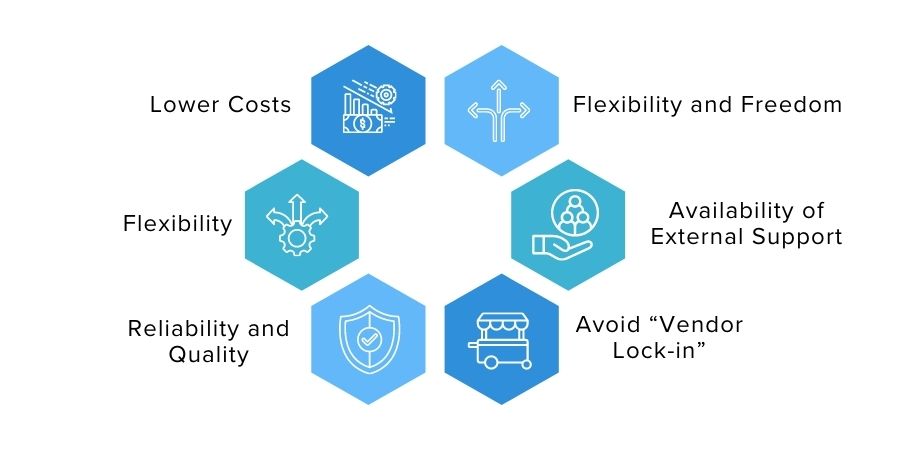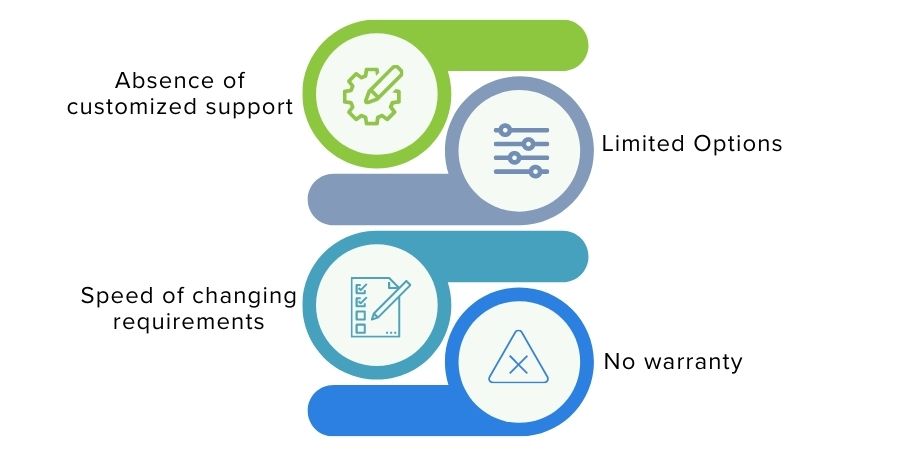
From full-scale ERP systems to Microsoft Office substitutes, Open Source software offers free options for small businesses that run out of budget for expensive enterprise applications. Even if they stick to closed-source operating systems for some reason, they can still benefit from sizable Open Source software. However, only some software comes at zero cost; the developer, a third party, or a low-code commercially licensed version is regularly provided at an additional cost.
This blog details how Open Source software plays the biggest role in unlocking the untapped growth potential for small businesses.
Understanding Open Source Software
Open Source software signifies a program whose source code is freely available under a license for modification or enhancement by anyone for reusability and accessibility. The Open Source software typically does not demand any license fee.
Open Source software can be manipulated as per users’ requirements and redistributed without violating any licensing obligations. Or, developers with access to the source code can enhance a program by adding features or correcting parts that don't always function properly.
Open Source software is developed in a decentralized and collaborative way through peer review and community contribution. Open Source software is usually less expensive, more adaptable, and has more longevity as it is produced by communities rather than by a single author or business.
Closed-source software restricts software utility which forbids users from modifying, distributing, copying, or republishing the source code. In contrast, closed-source software is proprietary software not made publicly available. Since the software is encrypted, only the authentic authors who developed the source code have the legal authority to copy, change, update, and edit the code.
Typically, several Open Source software has been used in many fields, including AI, ML, nanotechnology, data mining, enterprise search engines, web browsers, healthcare software, antivirus, Open Source dashboard software, Open Source DBMS software, and more. Some famous examples of Open Source software are Apache Web Server, the e-commerce platform, internet browsers, LibreOffice, and the GNU/Linux operating system.
An Impact of Type of Software on the Size of the Business
When running a startup or an SME, there are several key factors to consider:
- Costs: Every business wants to get value for money, but a small business needs to minimize expenses. It prevents added pressure on sales revenue.
- Number of Users: Closed-source software comes with a subscription fee that is only worthwhile when you have many users. So, it’s not suitable for many SMEs.
- Support: As a small business with limited in-house tech support, it would be the wisest approach to choose software solutions providing quick answers to any issues.
Finding suitable software agreements is not just a hunting task; many business owners believe that "if it can do the job, that's all we want. Gartner research says IT spending is growing YoY worldwide, majorly on unnecessary and excessive items. Businesses often need help selecting suitable software to reduce expenses. We need to choose the right software package for your business; otherwise, your business will squander time and money.
Open Source Software For Small Businesses
Reviewing Open Source software for your enterprises will result in many claims and denials regarding its perks and downsides. The reason is that while Open Source software may function exceptionally well in one business environment, it may be obstructive in another. In a core business context, it all depends upon what software you are using, your company's requirements, and selecting an Open Source product with certain advantages.
SMEs opt for Open Source software over any proprietary software due to its adaptability, security, community, stability, and more. The additional layer of benefits comes along with using Open Source, such as cost savings, reliability, and flexibility to customize code. Let’s look at the benefits of Open Source deeply;

Benefits of Open Source Software
Below are possible advantages for you to consider in terms of how OSS may benefit your business:
Lower Costs: One of the main factors in the decision by small businesses to use Open Source software is that it typically does not demand a licensing fee. However, if you're considering using Open Source software, consider the total cost of ownership.
Flexibility: A developer can change the code of a standard software product to meet specific business requirements better. You can hire a programmer to add a particular feature to Open Source software. Reliability and Quality: You must evaluate the products for better quality. Mature Open Source software is viewed as high-quality and reliable. If this is your first time using Open Source software, you can choose from some mature Open Source products. However, it is difficult to say that Open Source software is more reliable and quality than proprietary software.
Avoid “Vendor Lock-in”: If you use proprietary software, you can only work with a few selected vendors. Switching vendors entails high fees. Using an OSS product could not completely free you from vendor dependence.
Availability of External Support: Many open source software are supported by external technical assistance. Numerous Open Source products have active community support and can resolve your concerns via online blogs. In addition, some vendors offer support contracts, and there are also service providers who install, configure, and maintain an Open Source system.
Flexibility and Freedom: Owing to the adaptability of Open Source software, you can always be ahead of the competition by taking advantage of customized solutions. You can alter the source code to make additional features for your applications even if you don’t have enough funds to build a personalized solution made from scratch.

Shortcomings with Open Source Software
Considering that each product differs in quality and limitations, Open Source software has some downsides. However, some limitations can be circumvented using the right instruction and service support. Here are some potential limitations to look at:
- Absence of Customized Support: Open Source software does not include personalized email support or phone help compared to proprietary software. However, some commercial service providers offer on-demand support. Consider utilizing an open-source, cost-efficient solution than a proprietary product if you require major assistance.
- Limited Options: Open Source software has fewer options available.
- Speed of Changing Requirements: In the Open Source community, the software is modified frequently, making it difficult to ensure that the current version will be compatible with other applications.
- No Warranty: Open Source software usually has no warranty because no organization supports the software.
The Future with Open Source Software
The future is here at your fingertips; demand for Open Source software is sky-rocketing. Businesses embracing Open Source software are ready to thrive and flourish quickly. Open Source frameworks are increasingly being used to build web, mobile, and cloud solutions. In addition to this, some specific data and analytical solutions are only accessible on open source. From mobile solutions with the Android or iOS platform to web solutions where most websites are built using Open Source and cloud solutions that also leverage Open Source software as their foundation, future IT will utilize Open Source to evolve as a more resilient, scalable, and feasible ecosystem.



























 Batoi Corporate Office
Batoi Corporate Office